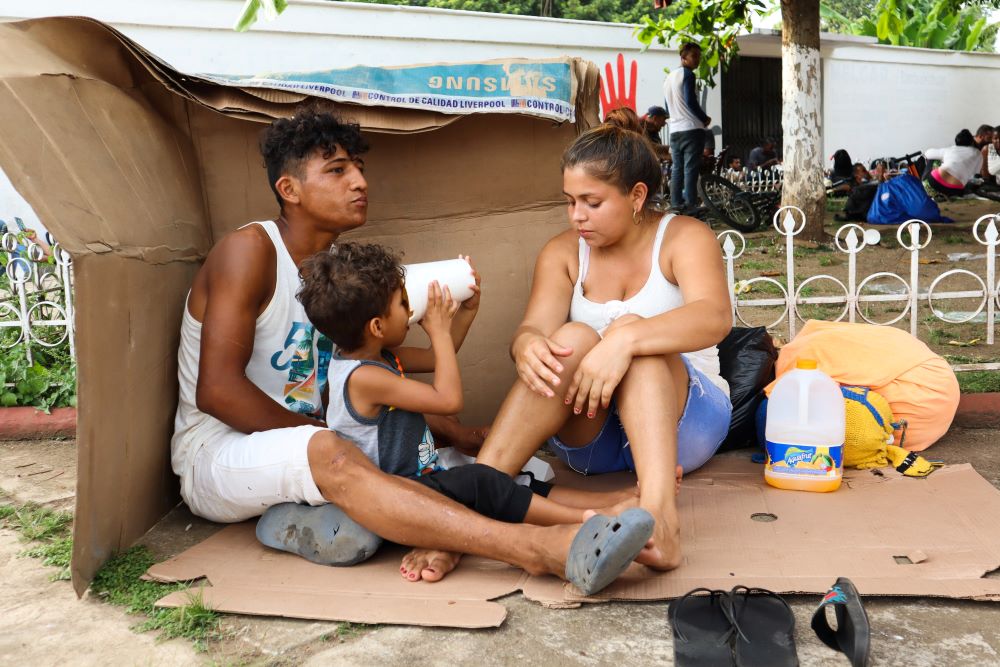
A migrant family in Huehuetán, Mexico, rests at a park with other caravan migrants heading to the U.S. border Nov. 18, 2021. (CNS/Reuters/Jose Torres)
There is no limit to the people coming. I'm told more arrive every day. It feels unmanageable.
Hundreds line up outside the cathedral in Juarez before the doors open: men, women and children waiting for a free meal. No questions asked. All that's required is that you stand for the blessing, eat quickly and clean up after yourself so that we can seat the next round of folks. Fourteen tables, eight to a table. That’s 112 people per round – and there will be several rounds before the day is over.
I hadn't thought about how impractical love is until I started serving plate after plate of warmed-over spaghetti, beans and rolls to table after table of migrants.
Here in Mexico, unlike at shelters across the border in El Paso, there's no quantifiable outcome to my efforts. No one to call to drive the families to the airport or bus so we can know they'll soon be in the safe harbor of their sponsor. Instead, they eat and pool back onto the streets or their room, for those who have money to afford one. All U.S. ports of entry remain closed to asylum seekers, as Title 42 remains in place.
When the spaghetti runs out – and it inevitably does – volunteers quickly improvise by opening cans of tuna, corn and peas, and throwing in huge dollops of mayonnaise to create a semi-satisfying alternative. That, too, may run out, depending on how many stragglers show up before the cathedral closes its doors later this afternoon.
"How do you know someone won't show up in line again later?" I ask a volunteer.
She shrugs. Her quizzical expression says, why does it matter?
When I volunteered in El Paso, we had order, a structure to the scenario of people arriving seeking asylum. We served a steady stream of migrants, but a manageable one. Many had legitimate claims for asylum. I felt like part of a humanitarian effort with a clear purpose.
Until the number of arrivals started to grow. And grow. Migration was no longer a methodical ebb and flow, but a stubborn tide that refused to go out.
I wonder – and worry – where will it all end?
I grow weary as the day crushes forward, tired of rushing from table to table, balancing paper plates and foam cups with sugar-watery oatmeal. I begin to react, even if just interiorly, to diners who don't acknowledge the plate of food with a "thank you." I feel disgusted with the person who sneaks a second meal when so many wait on folding chairs outside our doors. And I'm beyond frustrated with systems of governing that create the greed, exploitation and desperation that cause so many to leave home and prevent them from simply existing. Some days I rant with better alternatives. As if I could rule the world. Or would be good at it.
I'm clearly no Mother Teresa. Nor Dorothy Day. Apparently, I can only accompany people so far.
'Love won't let us live on our own terms.' That's for sure. Because if it did, I would naturally put limits on love.
Aware that I need an attitude check, I turn to other volunteers for encouragement. Of course, there are stalwart, selfless Catholic sisters among us. Models I don't even want to try to emulate. But there are also many sweet, youthful faces. I haven't yet discovered what brings these 20-somethings to volunteer four or more hours of their weekdays to serve destitute people. But I've come to know a few of them. One is Jaime, the Venezuelan migrant who arrives every day to tend to other migrants.
At 23, Jaime shoulders the responsibility of caring for his ill parents and younger sister back in Venezuela. The day his mother could feed only him and his sister and tried to pretend she and his dad had already eaten, he knew he had to leave home to support them.
On a break between wiping tables and waiting for the next procession to pile in, I ask Jaime about his job. I'd heard he was working as a barista at a local café. He says he starts at 3 p.m., right after he leaves here, and works until 11 p.m. every day. Like thousands of other Venezuelan migrants, he's seeking a "humanitarian exception" to enter the U.S. But whenever he uses CBP One, a U.S. Customs and Border Protection mobile app for migrants seeking entry, to schedule an appointment, the saturated system crashes. So he keeps rising early and sleeps little. Incredulous, I ask why he volunteers here with such a busy schedule.
"It fills my soul to help my friends," he says.
I stare for a moment, knowing that if I were him I'd probably be napping right now, catching up on sleep instead of feeding fellow competitors in the endless line for an outside chance to enter the land of opportunity.
While Jaime is learning English from us, I'm learning humility from him.
Unbidden, the words of Jim Finley, one of my spiritual teachers, come to mind: "Love won't let us live on our own terms." That's for sure. Because if it did, I would naturally put limits on love, conditions that must be met before I can open my heart fully. No such conditions exist with Jaime.
Advertisement
Nor with God. Which is why, at the end of a full day, I choose to sit like an unlearned child in the silence of the lap of God. I need to mellow out and soak up that love. Again. I settle onto my meditation mat and open the New Testament. The marked, tattered pages of 1 Corinthians fall open before me. I've highlighted the infamous Chapter 13 all over the place, but my eyes fall to this line: "There is no limit to love's forbearance, to its trust, its hope, its power to endure."
No limit!
I read it again. I think of the migrants at the cathedral. I see Jaime's boyish, welcoming smile. The message seeps in.
Am I being asked to live up to that kind of limitless trust? Hope? Forbearance? That kind of limitless love? Can I possibly let such an impractical, extravagant love order my life?
Certainly not on my own.
I close my eyes and open my hands. Waiting.
When the gong on my meditation timer app goes off, Nicholas of Flue's ethereal ending prayer pops up: "My Lord and my God, detach me from myself to give my all to you."
My God, my all? Yes, I know, it's the only way.








